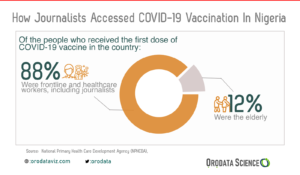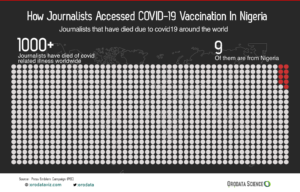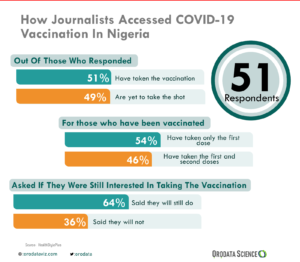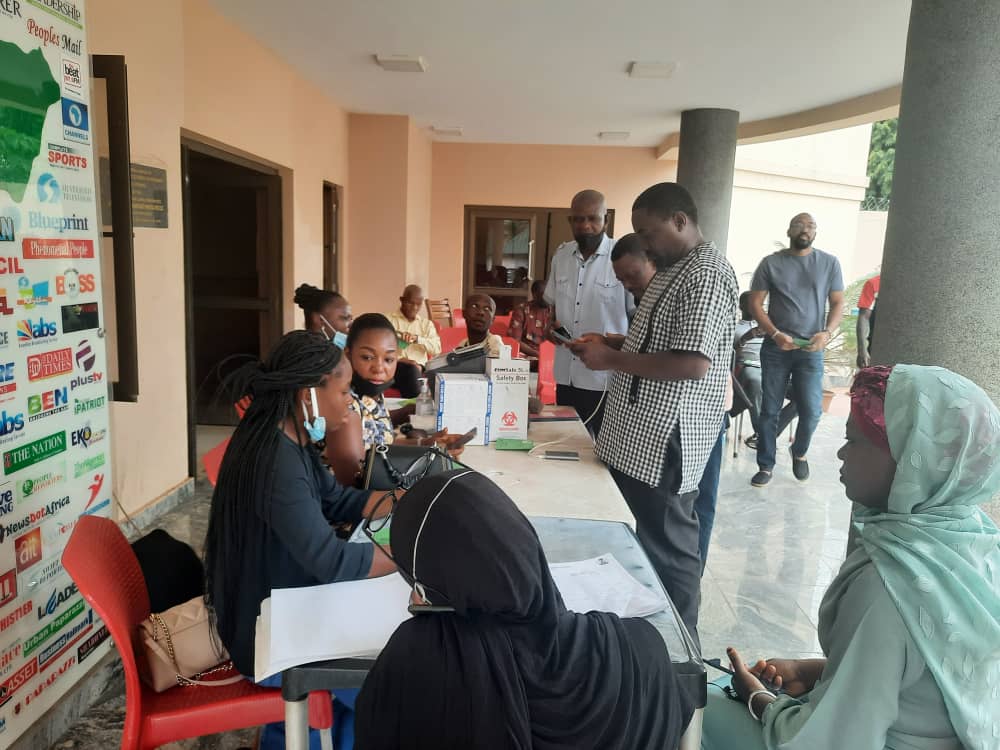After registering online for the COVID-19 vaccination in March 2021 as directed by the Federal Government, the Deputy Editor of NewDawn Newspaper, Charles Okogene waited to get a text message on when and where he should go for his first jab.
He got none and became agitated about what he termed the unreliable promise by the government as he stated in a Facebook post. However, a colleague replied to his post informing him that as a journalist categorised among frontline workers, he could access the vaccine at any Primary Health Centre in the state instead of waiting to be invited to take his turn.
However, pictures posted by two other journalists, Funmi Falobi, Editor, Social Development News and Temitope Ojo of Vanguard on Facebook about the ease with which they took the vaccination and having no immediate side effect at the Ifako Primary Health Centre, College Road, Ogba area confirmed that getting the vaccination should not be as difficult as it seemed for any interested journalist.
Based on the information he got from one of the two journalists, he went to the centre and was allowed into the premises when he introduced himself as a journalist.
“Without any delay, I was registered and given the vaccination to my surprise as I had thought that as is usual with government’s programmes, I would be there for hours,” Okogene recalled.
“The only thing that held me back from leaving after the vaccination was the requirement that we wait behind for at least 30 minutes to be sure there would be no side effects and there was none. I was very impressed with the smooth arrangement,” he added, noting that it was necessary to make the process of getting the vaccination stress free to encourage as many who should come for it to do so.
Okogene was one of the about ten journalists who got their vaccination at the Ifako centre in the state like other journalists, frontline workers and the aged who were given priority during the first exercise that commenced on March 12 and the second round that is currently underway nationwide.
On March 2nd 2021, the country received 3.92 million doses of the COVID-19 vaccine, through the COVAX facility, a partnership between CEPI, Gavi, UNICEF and WHO distributed to all 36 States and the Federal Capital Territory to kick-start the vaccination.
The country also received 300,000 doses of the Oxford-AstraZeneca COVID-19 vaccines from telecom giant, MTN, according to the Chairman of PTF on COVID-19, Boss Mustapha during one of his briefings.
Speaking on the outcome of the nationwide vaccination at a briefing by the Presidential Task Force on May 31 in Abuja, the Executive Director of the National Primary Health Care Development Agency (NPHCDA), Faisal Shuaib said two million Nigerians (1.956 million) had received the jabs of the Oxford-AstraZeneca COVID-19 vaccine.
According to him, 88 per cent of the first dose of the COVID-19 vaccine recipients were frontline and healthcare workers, including journalists, while the remaining 12 per cent were the elderly.

The inclusion of journalists among frontline workers was said to be in recognition of the role being played by journalists in the campaign against the spread of the virus.
Governor Babajide Sanwo-Olu at the flag-off of the vaccination exercise, on March 13, 2021, announced the inclusion of Journalists in Lagos State as frontline workers.
He urged journalists present at the Isolation Centre, Yaba for the flagship programme to take advantage of the process.
According to the Press Emblem Campaign (PEC), a non-governmental organization (NGO) with Special consultative UN status which aims at strengthening the legal protection and safety of journalists in zones of conflict and civil unrest or dangerous missions, over 1000 journalists have died of Covid related illness with nine of them from Nigeria.

This is a survey report on the support available to Nigerian journalists during COVID-19 by a coalition of civil societies. Just as frontline health care workers have been exposed to the virus while doing their jobs, journalists who cover stories amid movement restrictions and lockdowns have also been considerably exposed and require necessary support, including healthcare.
An investigation by Media Career Development revealed that apart from people who got the vaccination at various health centres, some state councils of the Nigeria Union of Journalists (NUJ) made special arrangements for their members to get the vaccine in conjunction with the Federal and State task committees in charge of the exercise.
OGUN STATE
About 118 practising Journalists in Ogun State took part in the vaccination exercise on March 19th and 22nd at the Secretariat of the Nigeria Union of Journalists (NUJ), Abeokuta.
The state government had to set up the vaccination centre for mainstream journalists at the NUJ Secretariat, popularly called Iwe Iroyin House according to Kunle Somorin, the Chief Press Secretary to Governor Dapo Abiodun, as their profession exposes them so much to the ravaging virus.
“Journalists are like health workers and security people who are on the road when everyone else stayed at home at the height of the pandemic,” he noted.
Some of the officials of the NUJ in the state were among the first set of journalists to take the jab to reduce the apathy and demystify the conspiracy theories woven around the vaccine. Some journalists who were at the vaccination centre declined to take the vaccination for undisclosed reasons.
A broadcast journalist, Olusegun Olukoga who took the jab said he felt a slight headache, fever and stooled at intervals between Friday night and Sunday morning, but fully recovered later.
ABUJA
In Abuja, the Council Chairman, Emmanuel Ogbeche said the turnout for the vaccination held at the union’s secretariat was encouraging with about 198 members getting the first dose on April 1 and 7, while the second dose was administered on June 1 and 4.
After the first dose of the AstraZeneca vaccine, Ogbeche said more members showed interest in getting vaccinated and were attended to at the minister’s office and the Federal Capital Territory Call Centre. 91 accredited journalists and media staff covering the Presidential Villa also got vaccinated at the State House Clinic.
Juliana Taiwo of The Sun Newspaper confirmed getting her first and second jab at the State House Clinic along with other colleagues.
“In the State House, the list of each department was sent to the clinic and we were asked to come on a particular day when it was the turn of the media. While I had severe body pains when I had the first jab, the effects of the second dose have been mild,” she said.
Although more journalists showed up during the second dose at the NUJ secretariat, Ogbeche said they could not be attended to as they were not part of the first exercise.
As a council committed to ensuring the health of its members, Ogbeche said “we felt persuaded that our members ought to be vaccinated to not only guarantee their immunity but to serve as the most credible and potent messengers in the face of vaccine hesitancy.”
KEBBI STATE
In Kebbi State, about 37 journalists officially received the COVID-19 vaccine on March 23 for attending to frontline health workers, journalists and some others who could be accommodated.
Some others also got vaccinated along with top government officials at the government house. A journalist who monitored the vaccination in the state but prefers to be anonymous said many journalists did not agree to be vaccinated on the first day and other occasions because they were sceptical about the effects of the vaccine.
NIGER STATE
Although there was no central arrangement for journalists to be vaccinated in Niger State, Justina Ashisana of The Nation Newspaper said she has taken the vaccination and eight other colleagues confirmed to her that they have.
Ashisana who is the coordinator of Media Mentors Network in conjunction with the Technology and Development Research Network (TEDREN) FUT organised a training for journalists tagged Vaccines Reporting Workshop for Journalists on April 21.
“The training had about 20 people and seven said they had gone to take the vaccine while three attendees later went for their vaccination. For the entire NUJ, I haven't asked everyone but eight out of the people I spoke to said they had received.”
OSUN STATE
In Osun state where there was also no coordinated arrangement for vaccination, some journalists were vaccinated on March 15, 2021, at the house of Osun State Caretaker Chairman, Prince Gboyega Famodun at Famson street, Igbona, Osogbo, when the health workers vaccinated members of the APC elders’ caucus.
Seven elderly journalists received the vaccine and the health workers promised that they would soon visit the NUJ council to give it to all the journalists in the state.
When the Chairman of the Nigeria Union of Journalists (NUJ), Osun State chapter, Comrade Wasiu Ajadosu, was contacted, he said the state government did not make provision for journalists in the ongoing COVID-19 vaccination exercise.
"We have approached the Commissioner for Health, Dr Rafiu Isamotu on the matter, he promised that our members will benefit in the second tranche of the vaccines. But as I am speaking with you, we have not heard from the government."
However, it was learnt that some journalists in the state received the vaccine based on self-recognition while others were privileged to get it on occasions.
ONDO STATE
In Ondo state, not less than 200 journalists got the first dose on March 31 during the vaccination at the secretariat of the state council of the NUJ.
NATIONWIDE
Although the number of journalists who took the vaccination in other states, including Lagos, the epicentre of the pandemic in the country is not available, a survey conducted for this report in conjunction with HealthStylePlus on how journalists accessed the vaccine across the country provided some insight on the response of journalists to the call on Nigerians to get vaccinated against COVID-19.
A questionnaire asking various questions about the vaccination was sent out to 150 Journalists made up of health reporters, editors and general reporters through WhatsApp platforms and emails across 18 states. There were only 51 respondents to the questionnaires.
States covered include Lagos, Ogun, Ondo, Edo, Anambra, Rivers, Imo, Taraba, Niger, Nasarawa, Kano, Bauchi, Plateau, Enugu, Ebonyi, Abuja, Osun and Ekiti.
The respondents were mainly health reporters and writers as well as general beat correspondents who daily cover the Nigeria Centre for Diseases Control (NCDC) and line editors who work on the news copies either online or on hard copies from across the 18 States.
Almost all the journalists understood they were front line workers and had known of at least a colleague who was either infected or suspected to have died of COVID-19 complications in 2020.
Among other questions, the journalists were asked if they had taken the vaccine or not, how many doses had been taken and if those who have not taken would still be willing to take it.
Out of those who responded after a week, 51 % said they have taken the vaccination while 49% said they were yet to take the shot.
For those who had been vaccinated, 54% had taken only the first dose, while 46% had taken the first and second doses.
Asked if they were still interested in taking the vaccination, 64% of those who had not been vaccinated said they will still do while 36% said they will not.

While those who had taken the vaccine said they did because of fear of being infected, assurances from experts that it was safe and the possibility of the evidence of vaccination for other purposes, those who declined to be vaccinated said they had doubts of the efficacy of the vaccine because it was produced under six months, the various conspiracy theories and alleged politicisation of the exercise.
Editor of HealthStylePlus, Yinka Sokunbi who had taken the two doses of vaccination said she was surprised that some journalists, especially health reporters who have all the necessary information about the health implications of the disease are not interested in taking the vaccine.
Chioma Obinna, a health correspondent with Vanguard Newspapers said she had not yet decided to take the vaccine, “As much as I know that the vaccines are safe, I am not just emotionally ready yet, to take it”. Vivian Agumuo, another health writer said, “I am just not interested in taking the vaccine”.
Another Reporter, Sharon Ijasan, Television Continental, TVC, said she was not prepared to take the vaccine, “Since taking the vaccine does not guarantee that one cannot contract the disease”.
Johnson Ayantunji, an editor with New Telegraph Newspaper and a COVID-19 survivor confirmed that he was yet to take the vaccine “because I had a long COVID recovery and was advised to wait until the symptoms completely clear of my system”.
Mr Edem Edem, a journalist with the National Post Newspaper in Calabar, Cross River State who was the first journalist to be vaccinated in Cross River state said he and some of his colleagues made up their minds to get vaccinated despite the negative stories about the vaccine.
“My colleagues have the same fears. Some have contracted the disease, some have not, but the fight against the Coronavirus is still on because it is our job to cover it,” said Edem. “We need to recognize the risks our journalists face in doing their essential work, investigating the causes and implications of health conditions such as COVID-19 and policies that impact health.”
Falobi said she initially didn’t want to take the vaccine, but after weighing the pros and cons that she may still eventually need to take if she has to travel out of the country, and that would be at a cost, she opted to be vaccinated.
“I also considered that as a journalist, I am exposed to COVID-19 in the course of my work, attending programmes and meeting all manner of people, so why shouldn’t I safeguard myself from harm? With this understanding and further advice from medical personnel, I decided to go for it.”
“I found the nearest COVID-19 vaccination centre in my area, showed them my identity card and I was attended to without much stress or protocol. I'd taken the first and second jab of the AstraZeneca vaccine to protect myself and the people around me. I would like to advise other Journalists to also take the vaccine. The Lagos State government has created a list of the COVID-19 vaccine centres, just check for the one nearest to you.”
Despite being recognised among the frontline workers, Falobi said she was shocked to discover that some journalists didn’t know that they are also part of those given priority and others were not convinced that they should take the vaccination.
“We cover those that are down with the virus and inform the public and in the process, we come in contact with those who might be infected and they might not know. We have families that we retire to at the end of the day and that is why we need to take the vaccine to protect ourselves and those around us.
“The vaccine is not painful. It is easy to get and our time is not wasted in getting it. It is better to keep safe and keep healthy than to live in self-denial. There is nothing to lose if you take it, but much to lose if you fall sick to the virus, now or in the nearest future,” she stated.
This Investigative Report is supported by Orodata Science


